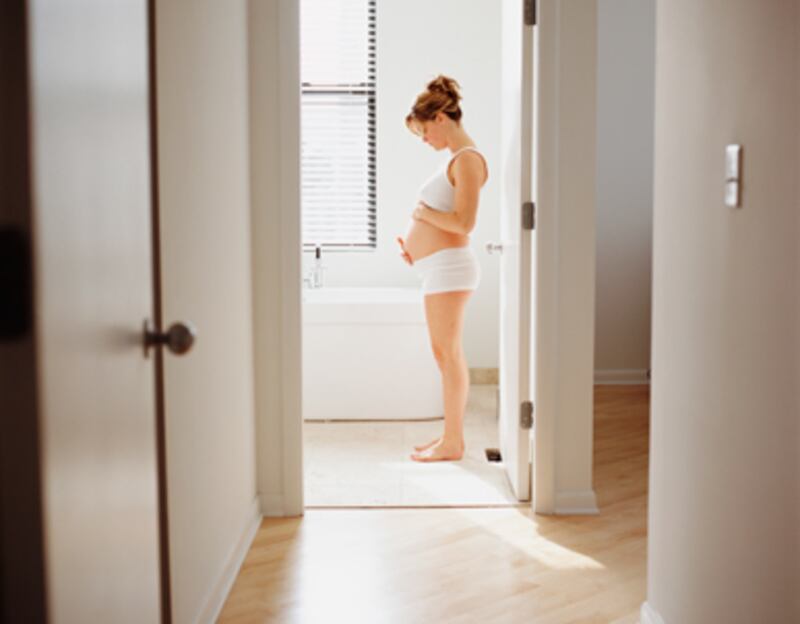ABC newsman Jim Sciutto and his wife’s birth plan for their second baby, aka “The Memo,” included iPod playlists and a trip to the hospital—not giving birth on their own bed without a doctor. He tells their incredible story.
When Gloria’s labor began early last Tuesday morning, slowly and mildly with contractions 10 minutes apart and bearable, everything seemed fine. In retrospect, my wife—journalist, mother, yoga phenom—clearly had a somewhat extreme interpretation of bearable. But at the time, we were thinking, hospital by lunch, baby by dinner?
That all changed just after 10 a.m., when her water broke. Gloria’s contractions suddenly went from 10 minutes apart to rapid fire. It reminded me a little of the moments in the field, in a firefight or a riot, when things turn from calm to chaos in seconds. When she caught her breath, my wife turned to me and calmly said, “We should go to the hospital.”
As journalists, we should have remembered you can’t plan the news. I’ve covered wars, government crackdowns, and natural disasters. You can make emergency plans: bring your helmet and flak jacket, get to high ground, or get out of Dodge. But don’t try to predict the outcome or the timing. It’s just not worth it.
Of course, things are different when your children are involved. As with our first son, Gloria planned to deliver our second naturally: In the hospital, but drug-free and without intervention. I walked away from the first birth in downright awe of what she endured. With the second, both of us thought we knew what was coming and while I’ll admit I had my reservations, my wife did not.
It is a huge personal challenge for her, one I don’t think men can’t fully comprehend. I call it her Everest. And as she told me, if you’ve stood on the summit once, you can’t help but try to see the view again. So, we had a birth plan, aka “The Memo,” and the firm support of our doctor to do this the old-fashioned way, with some not so old-fashioned touches: two iPod playlists, snacks for Gloria (pear juice, suitably hydrating but not too acidic), bags packed long ago, a car service to get us to the hospital, and our good friend Solange to provide moral support. I would play doula and dad. I was ready. After all, I had read “The Memo.”

I called the car service, but it quickly became clear I couldn’t get her up the stairs, much less out the front door. “The Memo” did not cover this. Gloria held on to me as calmly as possible while sinking her fingernails into my arm. I called the midwives at the hospital to warn them we might be on the way. Just listening to Gloria in the background, the midwife told me the obvious: “Call an ambulance.” But from what I could tell, the fastest ambulance in the world wouldn’t be there in time. There are those moments in stories when the facts line up and you do know where it’s going. Kneeling on that bathroom floor, I realized we were having this baby at home, possibly right on the bathroom floor, and probably alone. We were both calm. I guess we had to be.
I managed to carry her to the bed, my wife still managing to shout out an addendum to “The Memo”: “Strip the sheets! I’m not having this baby on our white wedding linen!” Of course I stripped the sheets, while simultaneously dialing 999, the British equivalent of 911. We assured each other we could do this on our own, but we both knew we’d love to have help.
I managed to carry her to the bed, my wife still managing to shout out an addendum to "The Memo": "Strip the sheets! I’m not having this baby on our white wedding linen!"
Hearing my wife in the background, the dispatcher sent not one but two ambulances, doubling the chances one would make it. And she kept me on the line. My Hollywood education kicked in. Clean towels and warm water, I asked? Nope, just the towels—and a safety pin. A safety pin? To clamp the cord, she explained. Holding my wife’s hand, I miraculously found one on our dresser. I’d taken several courses on battlefield first aid, but none covered childbirth. Armed with my safety pin, I prepared to deliver our baby.
At 10:52 a.m., little Caden entered the world. I was both ecstatic and disbelieving. We had to look around the room to remind ourselves where we were. And I was endlessly proud of my wife. But we weren’t done.
Just then, a calm young paramedic named Nick entered our bedroom. Thank God. Our son’s cord was wrapped around his neck. Nick slipped his fingers under it to give the baby some breathing room. Soon the rest of the emergency team arrived. Our bedroom was suddenly packed with six green-clad emergency medical workers from the London Ambulance Service. By 10:54 a.m., Caden was on his mother’s chest and a medic named Ruth was telling us, “Mummy, Daddy, get your hands on him. Let’s get his blood flowing.” We rubbed his brand-new body and watched as our son went from an unfamiliar blue to the rosy pink of a healthy baby. He let out a huge cry. Relief. There were no tears. I looked at my wife and we managed wide smiles.
Gloria’s and Caden’s recovery was nearly immediate. The medics told us there was no reason to go to the hospital unless we wanted to do so. The baby was healthy. Gloria was as strong as ever.
After our first son was born, I told my wife that childbirth should erase any man’s doubt about which is the stronger sex. This experience, well, has me bowing down to her and all mothers—plus the dispatcher and medics from the London Ambulance Service for their impeccable timing.
Jim Sciutto, newly based in Washington after eight years in London, reports for ABC News from all over the world, covering conflict, politics and breaking news in dozens of countries in Europe, Asia, Latin America, Africa and the Middle East, including repeated assignments in Iraq, Afghanistan and Iran. He is also the author of Against Us: The New Face of America’s Enemies in the Muslim World, published by Random House.






